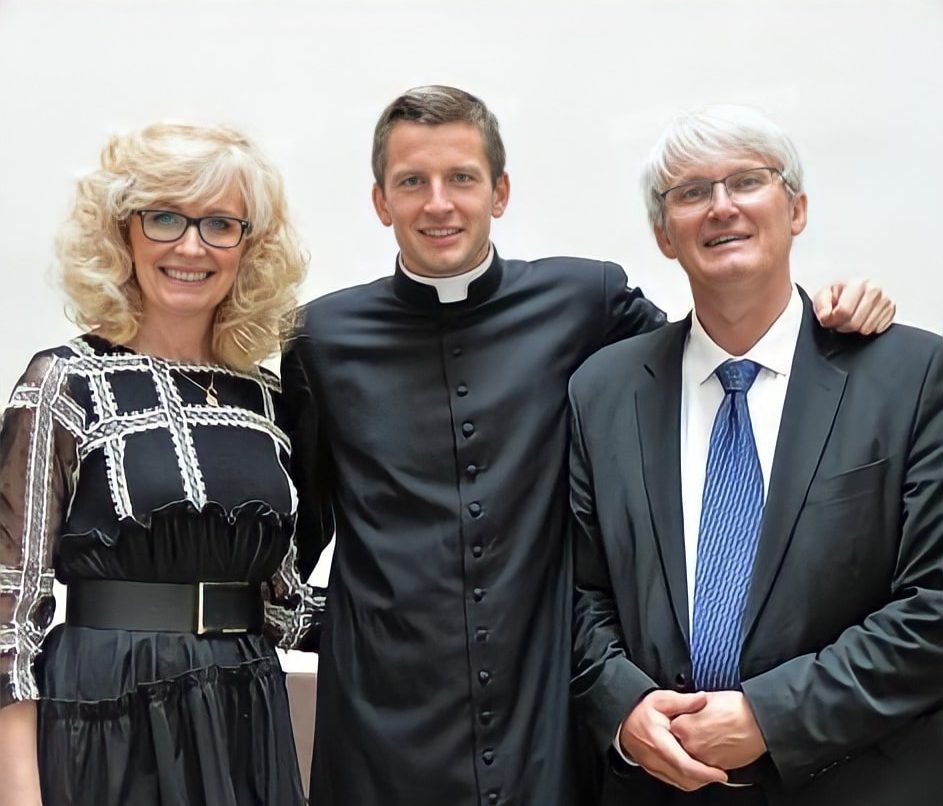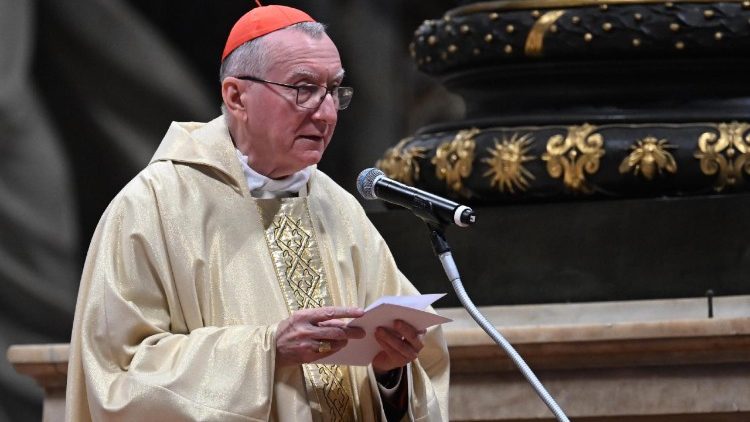Pope Encourages More Understanding
Interview with Young Slovak Priest, Father Branislav Borovsky

Young Slovak priest, Father Branislav Borovsky says that Pope Francis’ visit to his country “encourages us to be more generous with God and understanding of people whose opinion differs from ours. Pope Francis is the great defender of dialogue and of openness to others; we shut ourselves in our comforts, mental schemes, in our ways of being and doing. We can learn a lot from others.”
After the Holy Father’s 34th international Apostolic Journey to Budapest and Slovakia, Exaudi talked with young Father Borovsky, who was Ordained in Rome on May 22, 2021, along with 26 other members of the Opus Dei Prelature. He is the eldest of eight siblings; his family lives in Bratislava, but right now he is in Madrid, Spain, where he is in charge of the pastoral care of several schools.
This is the reason Father Borovsky was unable to accompany the Pope on the visit to his country. Nevertheless, he is very happy to “be able to support the Pope, his person and his intentions, through the Communion of Saints, praying, working, doing sacrifices for the apostolic fruits of his stay.”
The young priest talks about what this trip means for his Nation, about the different messages the Pontiff gave in the course of his visit, and about religious liberty, referring to the testimony of his own father, who in the 80s was imprisoned and persecuted by Communism for engaging in the contraband of books of a religious nature. He says his father is a “Confessor of the Faith who, together with others, preferred to risk their life to open the eyes of people’s heart who wanted <to read.> but didn’t have religious literature in the country.”
Here is a translation of the full interview with Father Borovsky.
* * *
Exaudi: The Director of the Holy See Press Office pointed out that the Pope’s trip would be “a trip of a special nature, a pilgrimage characterized by Eucharistic Adoration and devotion to the Virgin, who has watched over the pain of these peoples,” marked by the religious persecution of the Communist regime. As a young Slovak priest, why do you think this visit was important for your country? What does it mean for Slovaks?

Father Borovsky: In one of his addresses these days, the Pope spoke of the “affable and welcoming character, typical of the Slovak people, the traditional peaceful coexistence among yourselves, and your collaboration for the good of the country” (Ecumenical Meeting in the Apostolic Nunciature of Bratislava, September 12, 2021). In regard to the motive of the trip, the Pope explained: “I come as a pilgrim in a young country but of ancient history, in a land of profound roots located in the heart of Europe. I truly find myself in a “middle land,” which has witnessed many transitions. These territories have been the frontier of the Roman Empire and a place of interaction between Western and Eastern Christianity. From great Moravia to the Hungarian Kingdom, from the Czechoslovak Republic to today, you have been able, amid not a few trials, to integrate and distinguish yourselves in an essentially peaceful way. Twenty-eight years ago the world admired the conflict-free birth of two independent countries” (Meeting with the Authorities, the Civil Society, and the Diplomatic Corps in the garden of the Presidential Palace of Bratislava, September 13, 2021).
Slovakia is a traditionally Catholic country. There are married couples that form families open to life, and many young people that have great dreams. I think the Pope’s visit encourages us to be more generous with God and understanding with people whose opinion differs from ours. Pope Francis is the great defender of dialogue and of openness to others; not to shut ourselves in our comforts, mental schemes, in our ways of being and doing. We can learn a lot from others. We are a small country, with 5.5 million inhabitants, but a small seed can be transformed into a large and leafy tree. I have the hope that the Pope’s visit will help us, each man and each woman, to convert and come close to God and to others. It’s a motive of healthy pride to welcome the Vicar of Christ in our country, to allow ourselves to be surprised by what he wishes to transmit to us.
Exaudi: You are now living in Spain. How will you follow the Pope’s trip to your country?
Father Borovsky: I have not been able to travel to Slovakia during the Pope’s trip, given that I work in Spain. The principal means to follow his steps in my land is the Internet: I follow the short videos of Rome Reports and also his addresses on other Websites. I also speak with my relatives and friends about the visit, because they are there in an immediate way. I’m very happy to be able to support the Pope, his person, and his intentions, through the Communion of Saints, praying, working, and doing sacrifices for the apostolic fruits of his stay.
Exaudi: Which of the Pope’s events in the country would you highlight or call your attention more? Why?
Father Borovsky: When I saw that the Pope was going to celebrate Saint John Chrysostom’s Divine Liturgy I was very happy because the Slav countries are the bridge between the Latin Rite and the Oriental Rite. Saint Cyril and Saint Methodius, the Apostles of the Slavs, arrived in our territory in 863. They taught us Christ’s Gospel in a Slav language and developed the Glagolitic writing (the present Cyrillic). They also translated the Bible into the ancient Slav language. In 867 Pope Adrian II recognized the use of the ancient Slav language in the Liturgy. Although Catholics of the Greek Rite are between 3-4% of the Slovak population, the fact that Pope Francis celebrated Saint John Chrysostom’s Liturgy in Prešov, the center of Greek-Catholics in Slovakia, is very significant and shows the richness of the Church, which is one but not uniform.

Pope Francis talked about the two holy brothers — Cyril and Methodius who showed “a unity that, without being uniformity, is a sign and testimony of the freedom of Christ, the Lord who unties the knots of the past and cures of fear and insecurities” (Ecumenical Meeting in the Apostolic Nunciature of Bratislava, September 12, 2021). The Pope motivates us to deepen the contemplative characteristic” — a distinctive character of Slav peoples (Ibid.) — to embrace the mystery of Jesus Christ. He exhorts us to help one another to cultivate this spiritual tradition, which Europe so needs; in particular, the ecclesial West thirsts for it, to find again the beauty of the adoration of God and the importance of not conceiving the community of faith primarily on the basis of a programmatic and functional efficiency (Ibid.).”
Pope Francis returned several times to the treasure of Saint Cyril and Saint Methodius. In another address, he explained and exhorted us, saying: “They spread the Gospel when the Continent’s Christians were united, and still today they unite the Confessions of this land. They were recognized by all and sought communion with all: Slavs, Greeks, and Latins. Thus the solidity of their faith was translated into a spontaneous openness. It’s a legacy that you are called to pick up at this moment, to be also at this time a sign of unity” (Meeting with the Authorities, the Civil Society, and the Diplomatic Corps in the garden of the Presidential Palace of Bratislava, September 13, 2021).
Exaudi: What other aspects would you like to highlight of the Pope’s trip or of his message during the same?
Father Borovsky: The people that have been with the Pope these days, both in Bratislava as well as in other places of Slovakia, have been witnesses of the simplicity and kindness of the Holy Father. Pope Francis is very close to people and is interested in their problems. Those of us who have known the three Popes — Saint John Paul II, Benedict XVI, and Francis — can see that each one of them has identified himself with Jesus Christ and each of them is a genuine witness of the Lord’s life and message.”
Pope Francis’ visit to Rybné Námestie Square in Bratislava, where, historically, there was a Jewish Synagogue, is of great importance. Jews and Catholics lived in harmony in Pressburg (Bratislava was also called thus). Unfortunately, the Communists destroyed the Synagogue to build a bridge. The Synagogue was almost attached to the Catholic Cathedral of Bratislava.
In a special way, I enjoyed the Pope’s words at the Ecumenical Meeting in the Apostolic Nunciature of Bratislava: “The temptation exists . . . to be slaves again, certainly not of a regime, but of an even worse slavery, the interior one.” During the Communist period in Czechoslovakia (1948-1989), there was no religious liberty. However, today the danger of interior slavery, namely, the slavery of sin, is much more drastic.
I permit myself to mention a personal event. My father, being a University youth, was imprisoned and persecuted by the Communists during the 80s because he engaged in the contraband of religious books to Czechoslovakia with other friends. He is a Confessor of the Faith, together with others, who preferred to risk their life to open the eyes of the heart of people that wanted to read but didn’t have religious literature in the country. Pope Francis spoke of many witnesses of Christ from 1948 to 1989: “How many illustrious people were locked in prison, remaining free interiorly and offering luminous examples of courage, coherence, and resistance to the injustice, and, especially, of forgiveness.
This is the salt of your land” (Meeting with the Authorities, the Civil Society, and the Diplomatic Corps in the garden of the Presidential Palace of Bratislava, September 13, 2021).
Speaking of freedom, the Pope said that, without it, “there is no true humanity because the human being was created free and to be free. The tragic periods of your country’s history are great teaching: when liberty was wounded, violated and murdered, humanity was degraded, and the storms of violence, of coercion and of the privation of rights fell on it” (Meeting with the Bishops, priests, Religious, seminarians and catechists in Saint Martin’s Cathedral of Bratislava, September 13, 2021).
The Successor of Peter also talked a lot about fraternity and care of one’s neighbor. In one of his addresses he said: “There is no renewal without young people, who are often deceived by a consumerist spirit that withers existence. Many, too many in Europe are dragged in exhaustion and frustration, stressed by frenetic rhythms of life and without knowing how to find motivations and hope. The ingredient that is lacking is the care of others. To feel responsible for someone gives zest to life and enables us to discover that what we give is, in reality, a gift we give ourselves” (Meeting with the Authorities, the Civil Society and the Diplomatic Corps in the garden of the Presidential Palace of Bratislava, September 13, 2021).
Translation by Virginia M. Forrester
Related

John Paul II: The Tireless Pilgrim Who Continues to Inspire the World
Exaudi Staff
03 April, 2025
2 min

Pope Francis and Hope: Reflection on Jesus’ Encounter with Zacchaeus
Exaudi Staff
02 April, 2025
2 min

Technology with a Human Face: Pope Francis’ Call for Ethical and Caring Use
Exaudi Staff
01 April, 2025
1 min

Pope Francis Continues Optimistic Recovery and Maintains Work Pace
Exaudi Staff
01 April, 2025
2 min
 (EN)
(EN)
 (ES)
(ES)
 (IT)
(IT)

